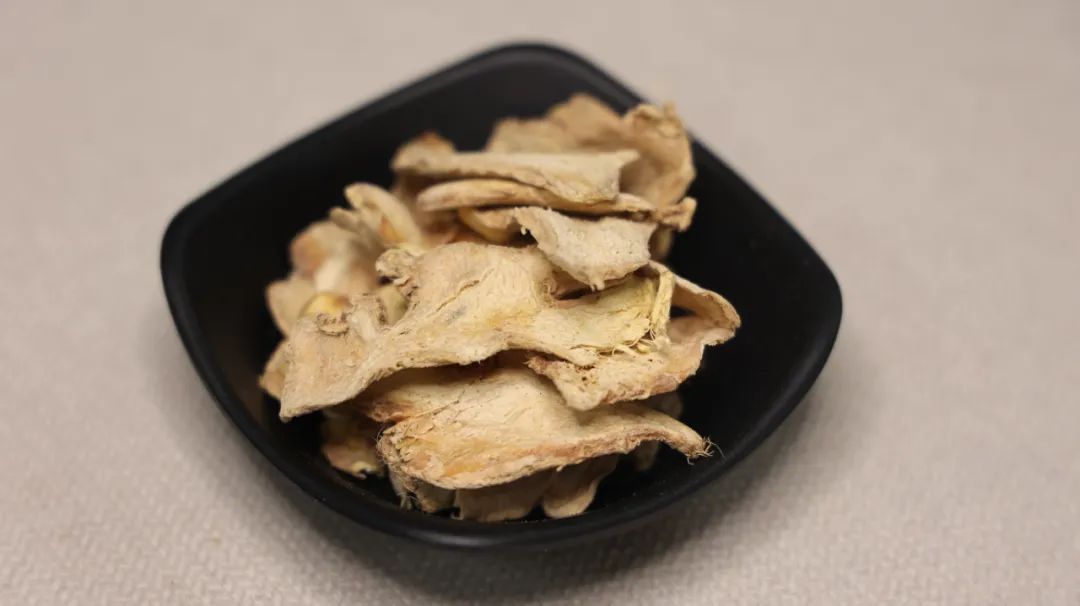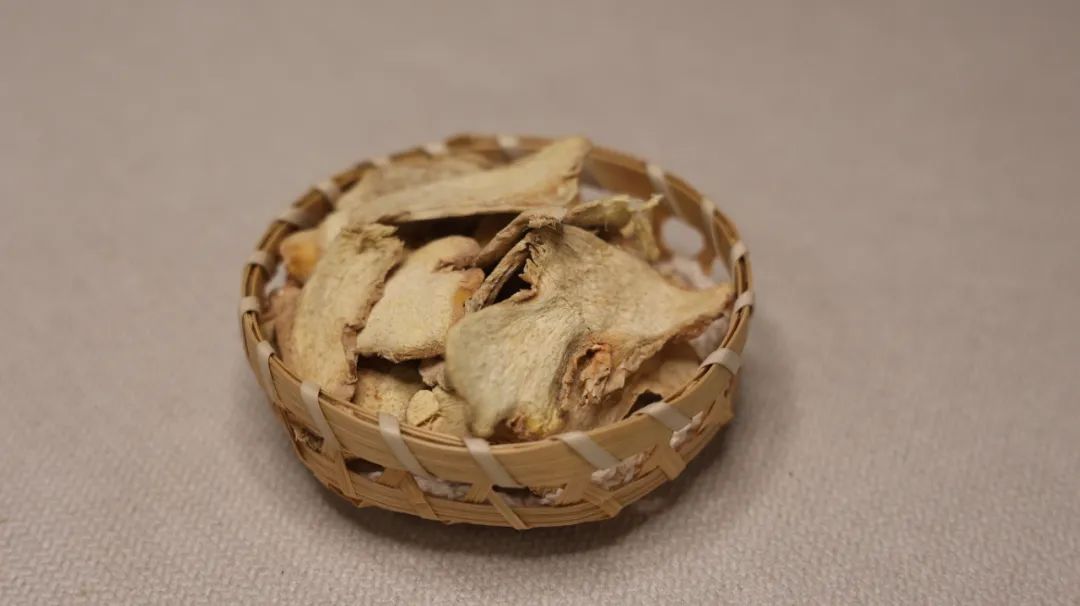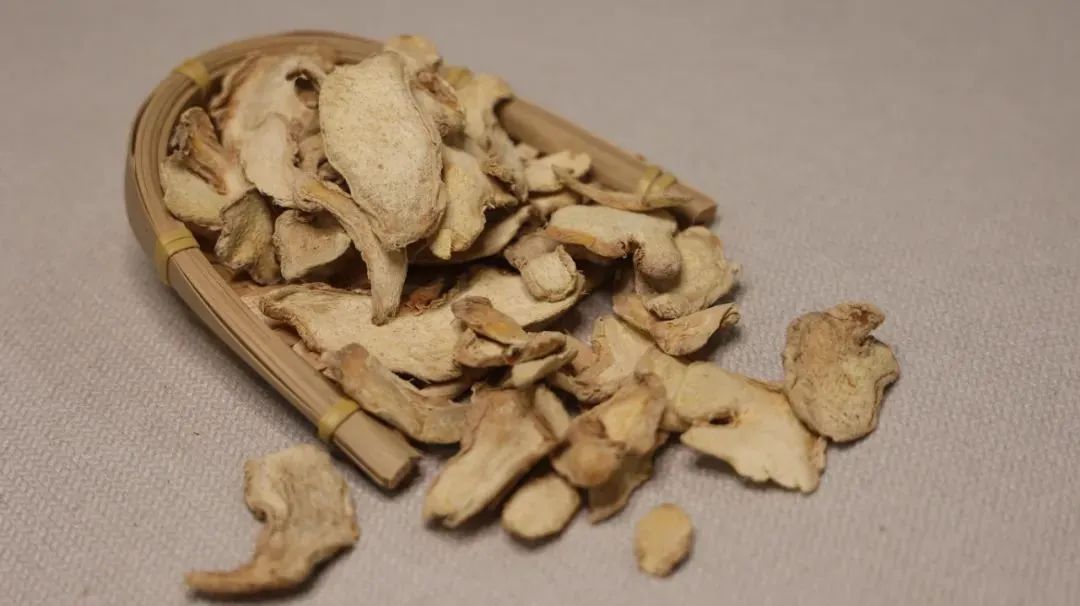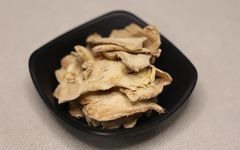Fresh ginger (sheng jiang) is different from dried ginger (gan jiang); they have different properties and effects. Fresh ginger is well-known, being fresh and moist. Dried ginger, however, is not simply sun-dried fresh ginger; it is made from mature ginger, with the skin removed and then dried. Dried ginger is a powerful warming herb, capable of dispelling cold. Its effectiveness in driving away cold is due to its intense heat. You can try a bit of dried ginger powder; it feels fiery in the mouth and induces warmth throughout the body. Where does dried ginger dispel cold from? Dried ginger primarily affects the heart (xin) and lungs (fei) as well as the spleen (pi) and stomach (wei), meaning it can drive away cold from the upper and middle jiao (regions of the body), but not from the lower jiao. Some may ask: If someone has cold in the upper jiao, can they just take dried ginger? It is not highly recommended. Why? While dried ginger does dispel cold, it has a characteristic: it is more of a stabilizing herb that does not easily disperse. If it remains stagnant, it cannot effectively drive away cold. So what should be done? This is where combinations come into play. The best partner for dried ginger is Fu Zi (Aconite), which circulates through all twelve meridians, helping to carry dried ginger throughout the body for effective cold dispelling. Many contemporary ailments are caused by cold; here are a few examples: People with cold in the heart often harbor dark thoughts and negative emotions, seeing only the gloomy side of things, which can be quite concerning. In contrast, warm-hearted individuals are helpful, share generously, and maintain an optimistic and loving demeanor. Those with cold in the lungs are prone to colds, runny noses, and coughs, especially in cold weather. When they catch a cold, they often have clear nasal discharge and may produce foamy phlegm, frequently experiencing nasal congestion, which in modern medical terms is known as rhinitis. The essence of rhinitis is “cold” and “phlegm”. Individuals with cold in the spleen and stomach are like soil that is too cold; they cannot eat cold foods, as it leads to diarrhea. They often experience abdominal pain, and when they do, they need to relieve themselves, feeling better afterward. When you touch their abdomen, it feels icy. Those with cold in their bodies cannot do without ginger; deep-seated cold often requires dried ginger, while superficial cold can be treated with fresh ginger. Dried ginger stabilizes but does not disperse, while fresh ginger disperses but does not stabilize; they are opposites.
Some may ask: If someone has cold in the upper jiao, can they just take dried ginger? It is not highly recommended. Why? While dried ginger does dispel cold, it has a characteristic: it is more of a stabilizing herb that does not easily disperse. If it remains stagnant, it cannot effectively drive away cold. So what should be done? This is where combinations come into play. The best partner for dried ginger is Fu Zi (Aconite), which circulates through all twelve meridians, helping to carry dried ginger throughout the body for effective cold dispelling. Many contemporary ailments are caused by cold; here are a few examples: People with cold in the heart often harbor dark thoughts and negative emotions, seeing only the gloomy side of things, which can be quite concerning. In contrast, warm-hearted individuals are helpful, share generously, and maintain an optimistic and loving demeanor. Those with cold in the lungs are prone to colds, runny noses, and coughs, especially in cold weather. When they catch a cold, they often have clear nasal discharge and may produce foamy phlegm, frequently experiencing nasal congestion, which in modern medical terms is known as rhinitis. The essence of rhinitis is “cold” and “phlegm”. Individuals with cold in the spleen and stomach are like soil that is too cold; they cannot eat cold foods, as it leads to diarrhea. They often experience abdominal pain, and when they do, they need to relieve themselves, feeling better afterward. When you touch their abdomen, it feels icy. Those with cold in their bodies cannot do without ginger; deep-seated cold often requires dried ginger, while superficial cold can be treated with fresh ginger. Dried ginger stabilizes but does not disperse, while fresh ginger disperses but does not stabilize; they are opposites. How can we effectively use dried ginger? Here is a summary of common combinations: 1. If there is significant cold in the lungs, with clear, thin phlegm and a sensation of cold in the upper back, this indicates real cold in the lungs. The following formula is appropriate: Dried ginger 8g + Xi Xin (Asarum) 5g + Wu Wei Zi (Schisandra) 3g. This formula is specifically used to resolve lung phlegm, and when combined with Fu Ling (Poria), it becomes a well-known formula: Ling Gan Wu Wei Jiang Xin Tang, which is specifically used to treat cold phlegm cough and wheezing. 2. If there is significant cold in the spleen and stomach, and the person cannot eat cold foods, often experiences diarrhea, and has a cold abdomen, then use: Dried ginger combined with Fu Zi, along with Bai Zhu (White Atractylodes), Ren Shen (Ginseng), and Gan Cao (Licorice), forming the formula: Fu Zi Li Zhong Wan, which is specifically used to dispel cold from the spleen and stomach. 3. For cold dampness in the lower back, with frequent soreness and pain that worsens in the morning or after exposure to cold, and the lower back feels icy, this indicates cold dampness causing back pain. The following formula is appropriate: Dried ginger 8g, Fu Ling 20g, Sheng Bai Zhu 15g, Zhi Gan Cao 10g. In fact, this is the formula known as: Shen Zhuo Tang from the Jin Gui Yao Lue (Essential Prescriptions of the Golden Cabinet).
How can we effectively use dried ginger? Here is a summary of common combinations: 1. If there is significant cold in the lungs, with clear, thin phlegm and a sensation of cold in the upper back, this indicates real cold in the lungs. The following formula is appropriate: Dried ginger 8g + Xi Xin (Asarum) 5g + Wu Wei Zi (Schisandra) 3g. This formula is specifically used to resolve lung phlegm, and when combined with Fu Ling (Poria), it becomes a well-known formula: Ling Gan Wu Wei Jiang Xin Tang, which is specifically used to treat cold phlegm cough and wheezing. 2. If there is significant cold in the spleen and stomach, and the person cannot eat cold foods, often experiences diarrhea, and has a cold abdomen, then use: Dried ginger combined with Fu Zi, along with Bai Zhu (White Atractylodes), Ren Shen (Ginseng), and Gan Cao (Licorice), forming the formula: Fu Zi Li Zhong Wan, which is specifically used to dispel cold from the spleen and stomach. 3. For cold dampness in the lower back, with frequent soreness and pain that worsens in the morning or after exposure to cold, and the lower back feels icy, this indicates cold dampness causing back pain. The following formula is appropriate: Dried ginger 8g, Fu Ling 20g, Sheng Bai Zhu 15g, Zhi Gan Cao 10g. In fact, this is the formula known as: Shen Zhuo Tang from the Jin Gui Yao Lue (Essential Prescriptions of the Golden Cabinet). 4. For mixed cold-heat patterns, where consuming hot foods leads to heat symptoms and cold foods cause diarrhea, and there is a sensation of fullness in the stomach with nausea and vomiting, this is a typical mixed cold-heat pattern. What to do? Use both cold and heat. Here is a formula: Dried ginger 8g + Huang Lian (Coptis) 5g, to harmonize cold and heat. The warming properties of dried ginger help disperse cold, while the bitter cold of Huang Lian helps clear heat, achieving a balance of “spicy to disperse and bitter to descend” to regulate the qi mechanism. Modern individuals have complex constitutions, and many exhibit this mixed cold-heat pattern. For this constitution, I have developed a foot-soaking formula, Qing Shang Wen Xia Pao Jiao Bao, which includes the combination of dried ginger + Huang Lian. Dried ginger can be taken internally to dispel cold, and dried ginger powder can also be used for foot soaking, which is quite effective for expelling cold; those with significant cold should give it a try. Who should avoid using dried ginger? Dried ginger is a strongly warming herb, so those with internal heat or who are prone to heat symptoms should use it with caution.
4. For mixed cold-heat patterns, where consuming hot foods leads to heat symptoms and cold foods cause diarrhea, and there is a sensation of fullness in the stomach with nausea and vomiting, this is a typical mixed cold-heat pattern. What to do? Use both cold and heat. Here is a formula: Dried ginger 8g + Huang Lian (Coptis) 5g, to harmonize cold and heat. The warming properties of dried ginger help disperse cold, while the bitter cold of Huang Lian helps clear heat, achieving a balance of “spicy to disperse and bitter to descend” to regulate the qi mechanism. Modern individuals have complex constitutions, and many exhibit this mixed cold-heat pattern. For this constitution, I have developed a foot-soaking formula, Qing Shang Wen Xia Pao Jiao Bao, which includes the combination of dried ginger + Huang Lian. Dried ginger can be taken internally to dispel cold, and dried ginger powder can also be used for foot soaking, which is quite effective for expelling cold; those with significant cold should give it a try. Who should avoid using dried ginger? Dried ginger is a strongly warming herb, so those with internal heat or who are prone to heat symptoms should use it with caution.


